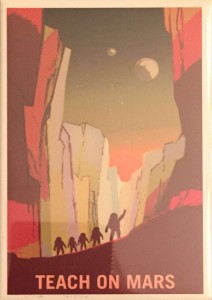 When I was a child, we visited Kennedy Space Center in Florida many times. One of the attractions was (and still is) the IMAX theater. One of the movies I saw there sticks with me even know. “The Boy from Mars” was the story of the first child born on Mars visiting the Earth for the first time. I think he was 12, and he was filled with anxiety for many reasons. One of the ones I can remember is the difference in gravity. (Martian gravity is about 1/3 of Earth’s gravity.)
When I was a child, we visited Kennedy Space Center in Florida many times. One of the attractions was (and still is) the IMAX theater. One of the movies I saw there sticks with me even know. “The Boy from Mars” was the story of the first child born on Mars visiting the Earth for the first time. I think he was 12, and he was filled with anxiety for many reasons. One of the ones I can remember is the difference in gravity. (Martian gravity is about 1/3 of Earth’s gravity.)
Teaching in 100 years will be like on Mars. It will be a new and possibly unimaginable world. There may even be educators actually teaching on Mars (or at least the moon). Is it really that unlikely to consider? The world of 100 years ago looked much different from the world of idea. Taking a plane to go somewhere was just becoming a reality and space flight was just a dream. Who could have imagined that 100 years later man would have stepped foot on the moon, established a permanently manned outpost in orbit, and sent unmanned craft exploring the outermost reaches of the solar system? How would a teacher 100 years ago possibly prepare students for today’s world?
Ultimately, it is not so much about the information and facts that we teach students that is important in the classroom. The chemistry course of 100 years ago would look much different from the course of today. For one, it would not have been required for all students like it is today. Also, even our basic understanding of the structure of an atom has evolved significantly in the past 100 years.
The most important things we can teach or model to our students are skills like critical thinking, creativity, communication, collaboration, persistence, work ethic, and problem solving. We can only imagine what the world 100 years in the future will look like, and that is why memorizing facts and information that can be easily referenced is not a reasonable use of our teaching time. Science is changing all the time! First Ceres was a planet, then an asteroid, and now it’s a dwarf planet. (Pluto is a similar camp.) And things we once thought impossible are now in the realm of reality. Facts do not matter as much as thinking.
It is hard to say what is impossible, for the dream of yesterday is the hope of today and the reality of tomorrow. Robert Goddard
The biggest thing we can do to prepare for the world of tomorrow is to teach our students to be independent thinkers who can solve problems creatively. If we do that, perhaps in 100 years we really will be teaching on Mars!